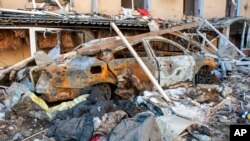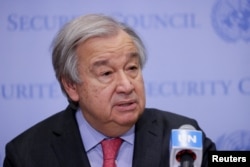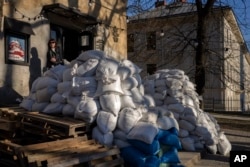U.N. Secretary-General Antonio Guterres said Tuesday that the “unwinnable” war in Ukraine is “going nowhere fast” and it is time the parties negotiate a cease-fire.
“From my outreach with various actors, elements of diplomatic progress are coming into view on several key issues,” Guterres told reporters at U.N. headquarters. “There is enough on the table to cease hostilities – now. And seriously negotiate – now.”
He did not give any details on where there may be potential agreement between the parties on key issues, nor who has emerged from a field of several possible mediators as a potential broker. But Ukrainian President Volodymyr Zelenskyy has essentially dropped his demand in recent days that Ukraine retain its right to join NATO, while Turkey and Israel are among potential mediators.
Guterres, who has been unusually outspoken on the war and in naming Russia as the aggressor, said the Ukrainian people are “enduring a living hell” since Moscow launched its “massive invasion” nearly one month ago.
“Systematic bombardments that terrorize civilians. The shelling of hospitals, schools, apartment buildings and shelters,” he said, has forced some 10 million people to flee their homes and even the country.
“Continuing the war in Ukraine is morally unacceptable, politically indefensible and militarily nonsensical,” the U.N. chief declared Tuesday.
He pointed to the Russian siege on the southern port city of Mariupol, which has endured weeks of shelling and bombing, and said even if it falls, the country cannot be “conquered city by city, street by street, house by house.”
“This war is unwinnable,” he warned. “Sooner or later, it will have to move from the battlefield to the peace table. That is inevitable.”
Until then, he asked, how many more lives will be lost and cities destroyed?
“It is time to end this absurd war,” Guterres said.
The U.N. Human Rights office has verified 953 civilian deaths since the war started on February 24 through late Monday, as well as 1,557 civilians who were injured. The U.N. says the actual number is likely much higher.
Humanitarian crisis
Humanitarians have been trying to get guarantees for safe passage so they can access people in need in several Ukrainian cities. On Friday, the U.N. said the first convoy arrived in the northern city of Sumy with food, bottled water and ready-to-eat meals for 35,000 people.
At the United Nations in New York, Mexico and France have been working on a draft resolution demanding protection of civilians and infrastructure, as well as of humanitarians, medical personnel, journalists and people fleeing the conflict. It could go for a vote in the General Assembly as soon as Wednesday, when a rare “emergency special session” of the U.N. membership is due to resume.
South Africa, meanwhile, has put forward a similar text, only it does not state the cause of Ukraine’s humanitarian crisis — namely, Russia’s invasion. The Western draft does.
Russian diplomats say they will seek a vote on their own text in the U.N. Security Council early Wednesday, where it is certain to fail.
On Tuesday, Russia for a third time pressed its allegations to council members that Ukraine, backed by the United States, is planning “chemical provocations,” which it will then blame on Russia.
“We presented evidence which, and more evidence is to come, to see that the United States was implementing a secret biological weapons program with the help of Ukrainians, and sometimes Ukrainians were not even aware of what they are doing,” Russian Deputy U.N. Ambassador Dmitry Polyanskiy told reporters.
U.S. Ambassador Linda Thomas-Greenfield told reporters the Russian allegations are “ludicrous” and reiterated Washington’s concerns that Moscow’s actions are the precursor to a chemical attack in Ukraine.
“They always sort of preview what they plan to do by accusing others of doing exactly the same thing,” Thomas-Greenfield said. “So, we see this as a false flag opportunity, and they are basically warning us of their future plans.”







